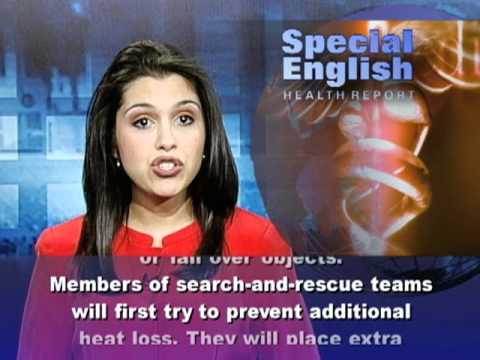Slow and Gentle Are Best in Treating Hypothermia
 |
I'm Alex Villarreal with the VOA Special English Health Report, from voaspecialenglish.com | facebook.com/voalearningenglish
We talked last week about ways to avoid cold-weather injuries. Today we are going to talk about emergency treatment of hypothermia.Hypothermia can be mild, moderate or severe. Mild hypothermia is something that most people in cold climates have experienced at one time or another. You feel so cold that your body starts to shake -- not very much, but uncontrollably. The treatment for mild hypothermia starts with getting out of the cold and, if necessary, changing into dry clothes. Drinking warm, non-alcoholic liquids and eating something sugary can stop the shivering. Taking a warm bath or sitting by a fire or doing some exercise can also help the body warm up. These are all common-sense treatments.But treatment needs change when people enter the moderate or severe stages of hypothermia. In that situation, their body temperature drops below thirty-five degrees Celsius. They lose the ability to think clearly. Their muscles become stiff. They might bump into things or fall over objects. Members of search-and-rescue teams will first try to prevent additional heat loss. They will place extra covering around the chest, head and neck of hypothermia victims to keep them warm. Hypothermia victims need medical help as soon as possible. Working quickly to get people out of the cold is important. However, hypothermia victims must be moved slowly and gently. Any rough or sudden movement can force cold blood from the arms, legs and hands deep into the warmer middle of the body. This sudden flow of cold blood can create shock, a serious condition. It can also cause an abnormal heartbeat. Members of search-and-rescue teams have a saying that hypothermia victims are not dead until they are warm and dead. The process of "rewarming" a person needs to be done slowly, in a hospital setting. An extremely low body temperature can cause the heart to beat so slowly that a pulse may be difficult to find. In other words, a person who is suffering from the effects of severe cold may seem dead, but still be alive.For VOA Special English I'm Alex Villarreal. If you missed last week's advice about how to avoid cold-weather injuries, you can find it at voaspecialenglish.com. We also invite you to share your stories of the coldest weather -- or the hottest weather -- you have ever experienced. You can share your stories on Facebook and Twitter at VOA Learning English.
(Adapted from a radio program broadcast 29Dec2011)
|




